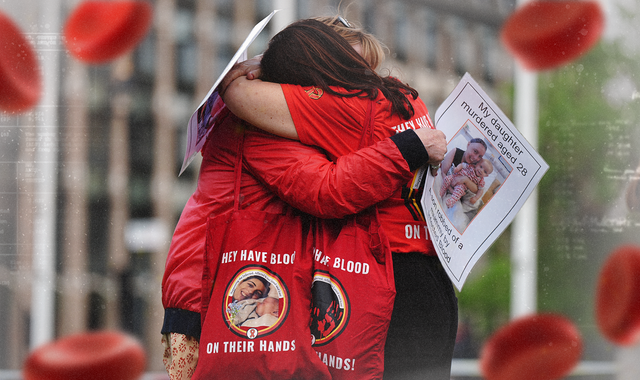Infected blood scandal 'not an accident', with 'catalogue of failures' and 'downright deception' by NHS and governments

The infected blood scandal was "not an accident" - and its failures lie with "successive governments, the NHS, and blood services", a public inquiry has found.
From the 1970s, 30,000 people were "knowingly" infected with either HIV or Hepatitis C because "those in authority did not put patient safety first", the inquiry's report said. Around 3,000 people died.
Follow live:
'Downright deception' - latest on long-awaited report
The response of the government and NHS has "compounded" victims' suffering, said inquiry chair Sir Brian Langstaff.
This included the "deliberate destruction of some documents" by Department of Health workers, in what Sir Brian described as a "pervasive cover-up" and "downright deception".
"It could largely, though not entirely, have been avoided. And I report that it should have been," he said, adding the "scale of what happened is horrifying" for victims and their families.
Among the report's key findings are:
Patients were knowingly exposed to unacceptable risks of infection;
Use of blood products was known to risk HIV infection by mid-1982 - and Hepatitis by the end of the Second World War;
Transfusions were frequently given in situations when they were not clinically needed;
Pupils at Treloar's school were regarded as "objects of research rather than children";
Children there were told they had HIV in "insensitive" ways;
The use of blood products on children at Alder Hey Hospital in Liverpool was "utterly inappropriate" in the 1980s;
Blood products imported to treat many people were unsafe and should not have been licensed for UK use;
There was no contact tracing carried out for Hepatitis C for four-and-a-half years after screenings were introduced;
There were repeated and ongoing failures by governments and the NHS to acknowledge people should not have been infected;
They repeatedly used inaccurate, misleading, and defensive lines;
From 1993 Department of Health employees marked files for destruction because of their contents;
Infected people were "cruelly" told they received the best treatment available;
They were also falsely told screenings for HIV and Hepatitis C were introduced as soon as the technology existed;
There was a refusal for decades to provide compensation;
Governments refused to set up a public inquiry until 2017.
Sir Brian's report makes 12 recommendations.
They include an immediate compensation scheme, memorials across the UK and at Treloar's school, which was overwhelmingly impacted, and that anyone who received a blood transfusion before 1996 is urgently tested for Hepatitis C.
New patients at any GP practice should also be asked if they have ever had a blood transfusion to find "more of the undiagnosed".
Prime Minister Rishi Sunak is expected to make an official apology on behalf of the government later today. The report stresses "it must be accompanied by action" for it to be meaningful.
Such action includes a "national recognition of this treatment disaster" and a change in the culture of "defensiveness" across the NHS and civil service.
The taxpayer-funded compensation scheme will reportedly cost around £10bn and is expected to be announced on Tuesday or Wednesday.
Sir Brian's report mentions various politicians by name, including Ken Clarke, who was health secretary from 1982 to 1985.
It describes him as "unfairly dismissive" and "disparaging" towards victims, saying that would have "aggravated" their distress and upset.
Margaret Thatcher's government claimed patients had "the best treatment available on the then-current medical advice" - but this was not true, the report also says.
'I lost my twin, cousins and two friends'
After the 2,527-page document was published, victims spoke at a news conference in central London.
Clive Smith, of the Haemophilia Society, said the "cover-up" came as "no surprise" to him and others affected.
"We've known for decades. Now the country knows, the whole world knows," he said. "This was systemic, by government, the civil service, and healthcare professionals."
Mr Smith added: "There are doctors out there who should have been prosecuted for gross negligence manslaughter… those people should have been in the dock."
The report cannot give findings on criminal liability.
Nigel Hamilton, from Haemophilia Northern Ireland, described the devastating personal impact of the scandal.
"I lost my twin on Christmas Day. I lost two cousins in the last two years. I have lost two friends in the last two months," he said.
"The production of this report has been both healing and supportive. Compensation is not an answer to the problems we have. But it will help."
Select below to read more about some of the victims:
Read more:
The stories behind 100 victims
'I gave my young son to his killers'
Analysis - Prosecutions must wait despite so many facing criticism
Jason Evans, from the Factor VIII campaign group, said: "Many of the politicians should hang their heads in shame… no single person has been responsible for this scandal."
And Andy Evans, representing the Tainted Blood campaigners, said victims had been "gaslit for generations".
Jackie Britton, from Bloodloss Families, said infected people are still struggling to get six-monthly scans and treatment.
"The government and the NHS should have a duty of care towards us," she said. "They have infected us, they have given us a death sentence."
Ahead of his remarks to campaigners and others involved in the report on Monday, Sir Brian was given a standing ovation.
But he said: "You're applauding the wrong people. This is your report. The words come from you and your stories."
He said: "People put their faith in doctors and the government to keep them safe and this was betrayed."

 Yahoo News
Yahoo News 
